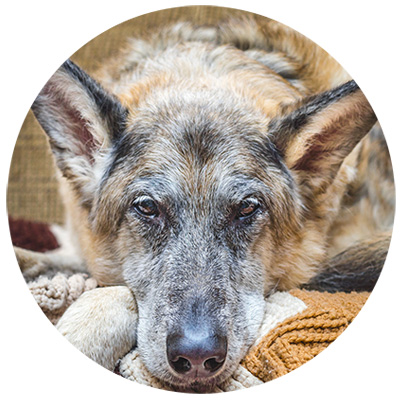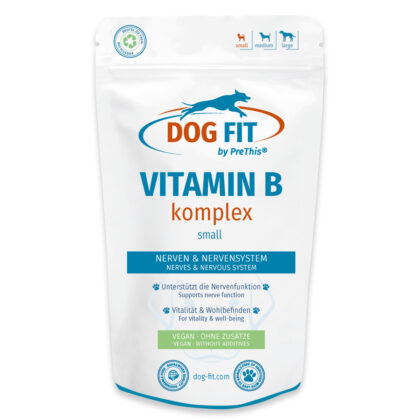Dementia is a disease that can affect not only humans but also dogs. It causes a progressive decline in mental abilities such as memory, orientation and learning ability. Dementia in dogs is also called cognitive dysfunction and can severely affect the behaviour and quality of life of the four-legged friend.
In this article, you will learn how to recognise dementia in dogs, what the causes are, how the progression develops and what you can do for your dog to slow down the dementia in the best case.
Many years ago I read an interesting treatise on the “disease of forgetfulness”. This is what the neo-pathologist and psychiatrist Dr Alois Alzheimer called this previously unexplored disease in 1906. However, it took almost 100 years until this disease also played a role in veterinary medicine. It has been proven that a loss of mental abilities can also occur in dogs, just as it does in humans. The finding is known as “canine Alzheimer’s”. Some symptoms are similar to those in humans. In dogs, they are usually dismissed as signs of old age and only recognised as dementia at a late stage. This also explains why only a few dogs with dementia are treated at an early stage.
Dementia in Dogs – Cognitive Dysfunction Syndrome
Cognitive dysfunction syndrome (CDS), also known colloquially as Alzheimer’s disease, also occurs in dogs at an advanced age. Damage to proteins and fats in the brain can result in the death of nerve cells. Unfortunately, in old age, the body’s own ability to correct this damage is reduced. The first symptoms of senile dementia can appear in large dogs as early as about 6 years of age and in small dogs from about 10 years of age.
The question of life expectancy cannot be answered in a general way. On the one hand, it depends on the stage and on the other hand, the course of the disease varies in many dogs. In the best case, your dog can be by your side for years until the disease unfortunately catches up with him. Statistically, one in four dogs will develop dementia, but there are things you can do for your dog before and during the disease.
Psychologist Stanley Coren from the University of British Columbia in Vancouver researched the mental abilities of dogs. These are thinking, recognising, learning, comparing, judging and imagining, the ability to draw conclusions and memory are also included. Dogs have both limited abstract thinking and spatial imagination, plus the ability to process information from previous knowledge. However, it is sometimes difficult to distinguish between a dog’s natural ageing process and dementia. The following 10 points provide some orientation.
10 typische Signale einer beginnenden Demenz
- Disorientation: The dog gets lost more often, even in familiar surroundings, or appears disoriented.
- Forgetfulness: The dog shows increasing forgetfulness, forgetting familiar places or repeated procedures.#
- Disoriented eating behaviour: The dog loses interest in food or forgets to eat.
- Decreased response to familiar stimuli: The dog reacts less to familiar sounds or voices.
- Decreased interaction: the dog withdraws, shows less interest in playing or contact with other dogs.
- Changes in behaviour: Aggressive or fearful behaviour may develop.
- Decreased ability to learn: The dog has difficulty learning new commands or tricks.
- Altered sleep patterns: The dog is restless at night and shows increased activity.
- Change in sleep patterns: The dog sleeps less at night and is more tired during the day.
- Involuntary urination and defecation: The dog can no longer control its excretion.
The causes of dementia in dogs
The exact cause of dementia in dogs is not known. However, it is thought that a number of factors may contribute, including:
- Age: Dementia is an age-related disease that is more common in older dogs.
- Genetics: Some breeds are more susceptible to dementia than others, e.g. Golden Retriever, Labrador Retriever and Beagle.
- Injury or disease: Injury or disease to the brain can cause dementia.
- Medications: Some medications can have dementia as a side effect.
- Toxins: Toxins, such as lead or arsenic, can cause dementia.
What can I do for my dog with dementia?
There is unfortunately no cure for dementia in dogs, but there are some things that can be done to slow down the disease. These include:
- A balanced diet: A balanced diet can help protect and maintain the dog’s brain.
- Plenty of exercise: Exercise keeps the dog physically and mentally fit.
- Positive reinforcement: Positive reinforcement can help build the dog’s self-esteem and motivate it.
- Regular veterinary check-ups: Regular veterinary check-ups can help detect and treat dementia early.
- Vitamin B complex: Vitamin B complex is important for brain function. It can help alleviate the symptoms of dementia and slow down the progression of the disease.
Furthermore, the so-called homocysteine level plays an important role in connection with the B vitamins. This is because the vitamin B complex can lower the homocysteine level. The higher the homocysteine levels, the faster the disease can progress.
The fact that you can do something for your dog is good news, considering the circumstances. Also interesting to know: B vitamins also contribute to the normal functioning of the heart, energy metabolism, blood formation, hormone balance, mental function, reduction of fatigue and restlessness and many other important functions of the dog’s organism.
The advantages of the B complex:
- contributes to strengthening & Regeneration of the nervous system at
- helps to relieve nerve inflammation
- contributes to normal nerve signal transmission
- also for incontinence
- also with tremors
- in states of exhaustion
- strengthens & revitalizes the organism
VITAMIN B complex for dogs
 Your get-to-know-you bonus
Your get-to-know-you bonus
DOG FIT by PreThis® VITAMIN B complex is dosed in three sizes small, medium and large according to need, vegan and free from additives.
Normally, DOG FIT by PreThis® VITAMIN B costs from 27,95 Euro (RRP). Thanks to our trial offer, you can get VITAMIN B from only 21.95 euros in our official DOG FIT shop. Together with your 5% new customer discount code, you can save money when you buy your first can!
The B-complex s only costs you from about 10 euros per month.
That’s from about 0.33 cents per day.
Your 5% new customer discount code: DOGFIT
Secure your discount in the shop now! (click

Every day we experience the wonders of nature with our dogs. This inspiration is the basis for our lives and our products. In our magazine we share with you our passion for these wonderful animals. Visit our socials and become part of the DOG FIT community.


 Your get-to-know-you bonus
Your get-to-know-you bonus

Leave a Reply